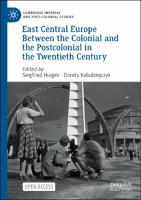East Central Europe Between the Colonial and the Postcolonial in the Twentieth Century
| dc.contributor.editor | Huigen, Siegfried | |
| dc.contributor.editor | Kołodziejczyk, Dorota | |
| dc.date.accessioned | 2023-04-13T14:03:08Z | |
| dc.date.available | 2023-04-13T14:03:08Z | |
| dc.date.issued | 2023 | |
| dc.identifier | ONIX_20230413_9783031174872_10 | |
| dc.identifier.uri | https://library.oapen.org/handle/20.500.12657/62375 | |
| dc.description.abstract | This open access book explores the ambiguity of East Central Europe during the twentieth century, examining local contexts through a comparative and transnational reworking of theoretical models in postcolonial studies. Since the early modern period, East Central Europe has arguably been an object of imperialism. However, at the same time East Central European states have been seen to be colonial actors, with individuals from the region often associating themselves with colonial discourses in extra-European contexts. Spanning a broad time period until after the Second World War and covering the governance of Communism and its legacies, the book examines how cultural and literary narratives from East Central Europe have created and revised historical knowledge, making use of collective memory to feed into identity models. | |
| dc.language | English | |
| dc.relation.ispartofseries | Cambridge Imperial and Post-Colonial Studies | |
| dc.subject.classification | thema EDItEUR::N History and Archaeology::NH History::NHD European history | en_US |
| dc.subject.classification | thema EDItEUR::N History and Archaeology::NH History::NHT History: specific events and topics::NHTQ Colonialism and imperialism | en_US |
| dc.subject.classification | thema EDItEUR::N History and Archaeology::NH History::NHB General and world history | en_US |
| dc.subject.classification | thema EDItEUR::N History and Archaeology::NH History::NHT History: specific events and topics::NHTB Social and cultural history | en_US |
| dc.subject.other | Central Europe | |
| dc.subject.other | European modernity | |
| dc.subject.other | Post-dependence | |
| dc.subject.other | European Empire | |
| dc.subject.other | Europeanness | |
| dc.subject.other | Post-colonialism | |
| dc.subject.other | European society | |
| dc.subject.other | Orientalisation | |
| dc.subject.other | Cultural imaginaries | |
| dc.subject.other | Periphery | |
| dc.subject.other | Political history | |
| dc.subject.other | EU | |
| dc.subject.other | Post-socialism | |
| dc.subject.other | Post-Communism | |
| dc.subject.other | Nationalism | |
| dc.subject.other | Identity | |
| dc.subject.other | Literary studies | |
| dc.subject.other | Anti-colonialism | |
| dc.subject.other | Migration | |
| dc.title | East Central Europe Between the Colonial and the Postcolonial in the Twentieth Century | |
| dc.type | book | |
| oapen.identifier.doi | 10.1007/978-3-031-17487-2 | |
| oapen.relation.isPublishedBy | 6c6992af-b843-4f46-859c-f6e9998e40d5 | |
| oapen.relation.isFundedBy | e8f0c0d0-91e0-44df-b9f0-f9191ff59371 | |
| oapen.relation.isbn | 9783031174872 | |
| oapen.relation.isbn | 9783031174865 | |
| oapen.imprint | Palgrave Macmillan | |
| oapen.pages | 265 | |
| oapen.place.publication | Cham | |
| oapen.grant.number | [...] |

